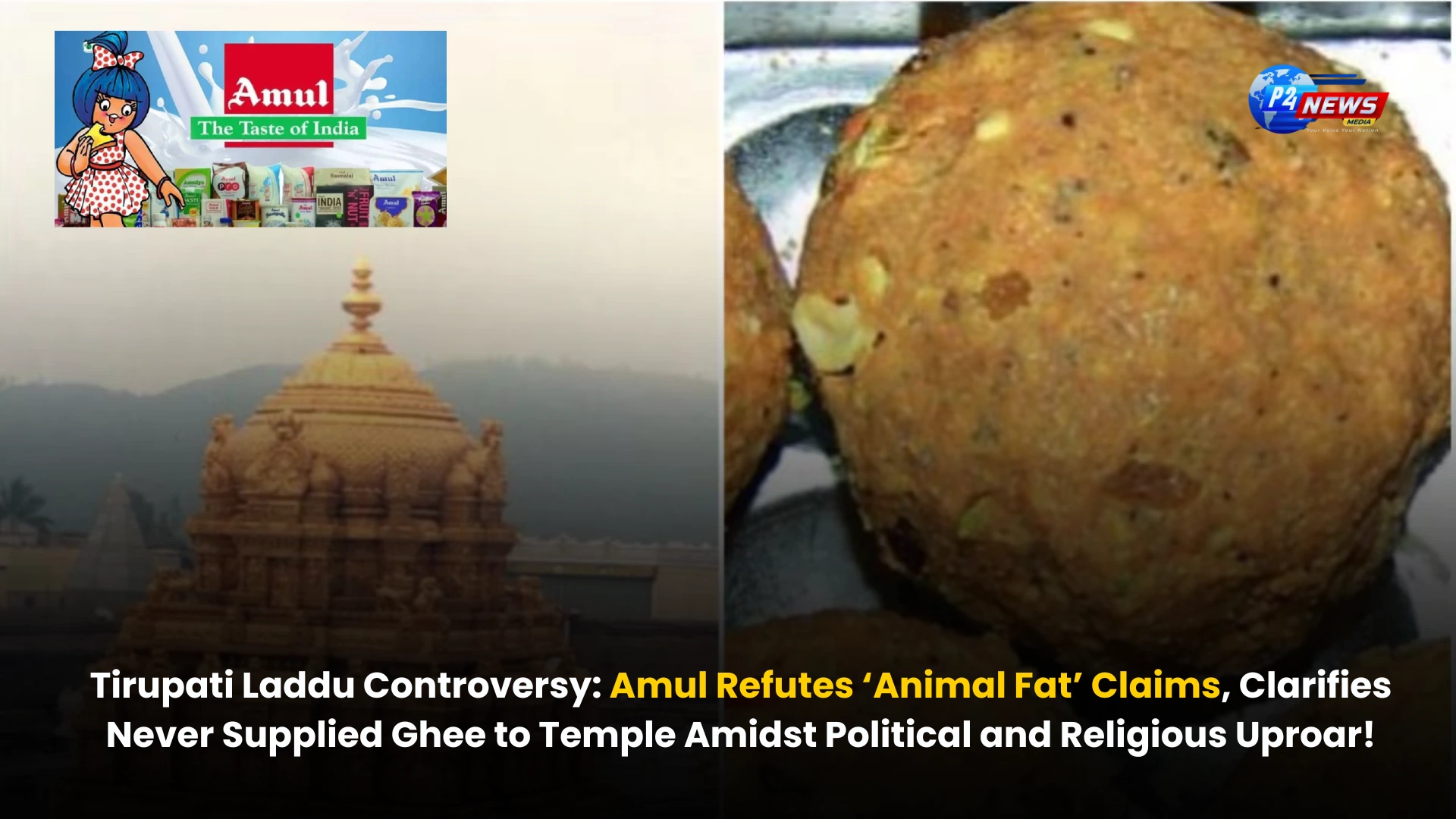Amul has denied allegations by the Telugu Desam Party (TDP) regarding the use of “animal fat” in Tirupati laddus during the previous YSRCP government’s tenure. In a statement issued on Friday, the dairy giant clarified that they have never supplied ghee to the Tirumala Tirupati Devasthanam (TTD) for laddu preparation.
Amul Denies Supplying Ghee to Tirupati Temple
Amul has denied allegations by the Telugu Desam Party (TDP) regarding the use of “animal fat” in Tirupati laddus during the previous YSRCP government’s tenure. In a statement issued on Friday, the dairy giant clarified that they have never supplied ghee to the Tirumala Tirupati Devasthanam (TTD) for laddu preparation. This comes after accusations surfaced on social media claiming that Amul Ghee was being used in the prasadam offered to Lord Venkateswara. “We wish to inform that we have never supplied Amul Ghee to TTD,” the company stated on X. The statement further emphasized that Amul Ghee is produced from high-quality pure milk fat at their ISO-certified facilities, and undergoes rigorous quality checks, including adulteration detection as specified by the Food Safety and Standards Authority of India (FSSAI). Amul also reiterated their position as India's most trusted ghee brand for over 50 years and asserted that this statement was issued to counter the misinformation campaign against the company.
Clarification from AR Dairy
Meanwhile, AR Dairy, a Tamil Nadu-based company that supplied ghee to the Tirupati temple, clarified that their product samples had been certified for quality by the authorities. The Dindigul-based firm stated that they only supplied ghee to the temple during June and July, and each batch was accompanied by accredited lab reports. This clarification came after allegations from TDP chief N Chandrababu Naidu, who accused the previous administration of purchasing low-quality ghee at reduced prices for TTD. He stated, “Today, we have changed the ghee supplier and have started procuring Nandini brand ghee from Karnataka.” The issue of ghee quality has become a significant point of contention, with Naidu accusing the former government of compromising the sanctity of the temple by using substandard ingredients, which allegedly included animal fat in the preparation of the renowned laddus.
TTD Supports Naidu’s Claims; Jagan Dismisses Allegations
The controversy escalated when the TTD, responsible for managing the Tirupati temple, supported Naidu’s claims about the presence of animal fat in the prasadam. The TTD Executive Officer stated that four reports of samples tested revealed similar results, prompting them to immediately stop receiving supplies from the contractor. The contractor has been blacklisted, and penalties are being imposed. However, YSRCP president and former Chief Minister YS Jagan Mohan Reddy dismissed the allegations as “atrocious” and accused Naidu of using religious matters for political gain. Reddy suggested that the accusations were a tactic to distract the public from the government’s achievements during its first 100 days in office.
Challenges in Quality Assurance
The Executive Officer of TTD also highlighted the challenges faced in maintaining quality assurance. He pointed out that the lack of an in-house lab for testing, reliance on outside laboratories, and unviable rates for pure cow ghee had allowed suppliers to exploit these shortcomings. He mentioned that the ghee was being supplied at prices between ₹320 and ₹411, which is not sustainable for delivering pure cow ghee. This issue has raised concerns about the procurement process and the measures needed to ensure the sanctity and quality of the ingredients used in preparing the temple’s prasadam.
Religious and Political Outrage Over Allegations
The Tirupati laddu, which is offered as prasadam at the temple, has been a matter of pride and devotion for millions of devotees. The recent allegations have not only sparked a political row but also upset religious sentiments, as many Hindus consider the consumption of animal products like beef tallow and lard to be against their religious beliefs. The TDP claimed that a lab report from Gujarat had found traces of “beef tallow” and “lard” in the laddu ingredients, leading to widespread outrage. The issue has also fueled a political blame game between the TDP and the YSRCP, with both parties accusing each other of tarnishing the reputation of the temple.
Historical and Cultural Significance of the Tirupati Laddu
The Tirupati laddu, also known as Srivari laddu, has a long history and is an integral part of the offerings at the temple of Lord Venkateswara. According to an official from TTD, the tradition of offering laddus dates back to the 1920s. The laddu holds a geographical indication tag, which grants the TTD exclusive rights to sell the sweetmeat and prevents others from marketing it under the same name. This makes the laddu not only a religious offering but also a symbol of the temple’s heritage and a significant source of revenue. Available in three sizes—small, medium, and large—the laddus are priced at ₹50 for medium and ₹200 for large ones, while small laddus are distributed free of charge to devotees visiting the temple.
Concerns Over Quality Control and Devotee Sentiments
The recent controversy over the use of allegedly adulterated ghee has put the Tirupati laddus in the spotlight for all the wrong reasons. The allegations have not only hurt the religious sentiments of devotees but have also raised serious concerns about the quality control measures at one of the world’s richest temples. As the political and religious fallout from this issue continues, the TTD and the Andhra Pradesh government will need to work together to restore the faith of millions of devotees in the sanctity of the prasadam and the temple’s management practices.
















Comments 0